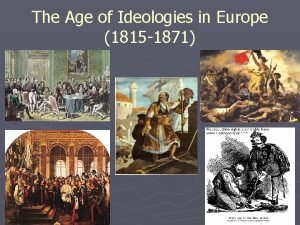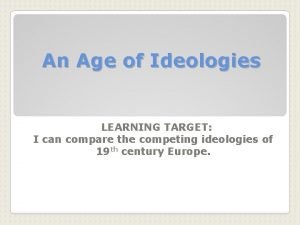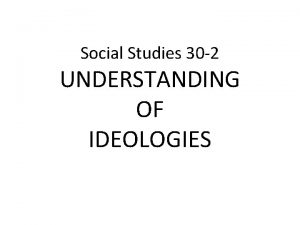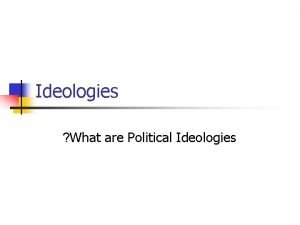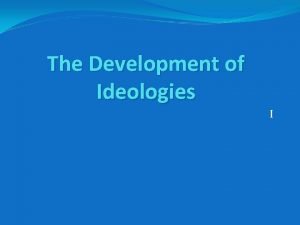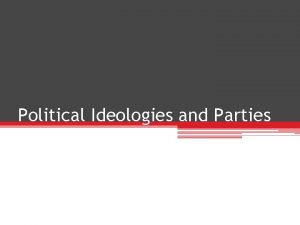An Age of Ideologies LEARNING TARGET I can










- Slides: 10

An Age of Ideologies LEARNING TARGET: I can compare the competing ideologies of 19 th century Europe.

�After the French Revolution and the Age of Napoleon, there were different ideas and beliefs about what direction society should go in. �Conservatives �Liberals �Nationalists

�Conservatives: Think Metternich at the Congress of Vienna. ◦ Wanted to preserve the “old order” ◦ Stressed: �Tradition (traditional social hierarchy) �Hereditary monarchy (divine right) �Landowning aristocracy �An official church (remember, Enlightenment thinkers were deists. ) �Mercantilist economy �Wanted to maintain status quo or only SLOW change CONSERVATISM

Prince Clemens von Metternich, Austrian foreign minister, leader at Congress of Vienna

�Liberals: Think John Locke and other Enlightenment philosophers (mostly bourgeoisie) ◦ Were inspired by the Enlightenment and the American and French Revolutions. ◦ Principal Ideas: Liberty and Equality ◦ Wanted: �representative government (written constitutions, separation of powers) �Freedom of speech, press, etc… �Laissez faire economics (capitalism) LIBERALISM

John Locke, English Philosopher

�In the 1800 s, Europe had several empires that included many diverse nationalities. ◦ Austrian Empire ◦ Russian Empire ◦ Ottoman Empire �EX: Austrian Empire: Germans (dominant, but only made up ¼ of the population; Hungarians, Czechs, Italians, Poles, Ukrainians, Serbs, Romanians, etc… ◦ Nationalism was based on the belief that each group of people has its own cultural identity/unity and should have their own state. NATIONALISM

Europe, 1815

�Which of the ideologies we discussed today represented change? �How did Napoleon’s empire building contribute to feelings of nationalism in Europe? �Can you predict the impact nationalism has had on history? Critical Thinking Questions

�Rebellion erupted in the Balkan Peninsula – Southeastern Europe �The Ottoman Empire had ruled over several religious/ethnic groups for 300 years ◦ 1. ) Serbs - won autonomy in 1830 �Russia helped them. Why? Common Slavic language and Christian Orthodox religion ◦ 2. ) Greeks – gained independence in 1830 ◦ 3. ) Other revolts in Spain, Portugal, and Italy were crushed by France and Austria. Central Europe Challenges the Old Order
 An age of ideologies
An age of ideologies An age of ideologies
An age of ideologies Stone age, bronze age iron age timeline
Stone age, bronze age iron age timeline Iron age bronze age stone age timeline
Iron age bronze age stone age timeline Democratic socialism
Democratic socialism Discourse ideology
Discourse ideology Social studies 30-2 textbook
Social studies 30-2 textbook Two dimensions of political ideologies
Two dimensions of political ideologies Ap gov unit 4 political ideologies and beliefs
Ap gov unit 4 political ideologies and beliefs Ideologies examples
Ideologies examples Introduction to the curriculum ideologies
Introduction to the curriculum ideologies
